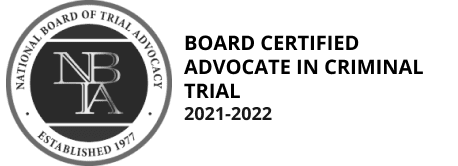If you have been charged with aggravated assault in Houston, Texas, contact attorney Mark Thiessen at 713.864.9000 or request a free case evaluation. We serve Houston and the surrounding areas and are available 24/7 to fight for you.
Houston Aggravated Assault Lawyer
Although aggravated assault can happen in a split second, it is one of the most serious criminal charges a person can face in our justice system — any good Houston aggravated assault lawyer will tell you that. You can get them for fighting, getting into dangerous situations, and even defending yourself, and yet at minimum, aggravated assault charges are tried as second-degree felonies in Texas.
Second- and first-degree felonies come with mandatory prison sentences which can alter the course of your life forever if you’re convicted. This is why, if you or a loved one have been accused of aggravated assault, it is vital that you enlist the help of an experienced aggravated assault lawyer immediately, one who can defend your life and help you tell your side of the story.
Thiessen Law Firm’s Mark Thiessen knows that there are always two sides to a story. He’s Board Certified in Criminal Law by the Texas Board of Legal Specialization and has a proven track record of crafting trial-ready, successful defense strategies for those accused of aggravated assault.
If you’ve been accused of aggravated assault, your freedom depends on the steps you take next. Call (713) 864-9000 to speak to an experienced aggravated assault lawyer at Thiessen Law Firm today.
Mark Thiessen is a criminal defense all-star. If he can’t get you a win, nobody can.
I’ve worked with Mark and his team on two very different cases, and both times I’ve been blown away by the level of honesty, strategy, and respect that Thiessen Law Firm brings to the table…
Posted by Adam, an Assault Client
View More Testimonials
What is the Texas law on aggravated assault?
According to the Texas Assault Penal Codes, including Texas Penal Code § 22.02, one can be charged with aggravated assault if one intentionally, knowingly, or recklessly assaults another person with an additional aggravating factor to the case such as serious bodily injury to another person. Another aggravating factor in these cases is whether or not the defendant is accused of assaulting someone with the use of a deadly weapon (with use being defined as broadly as only showing or displaying the weapon).
Continue reading: What’s the difference between assault and aggravated assault?
The difference between assault and aggravated assault
To make things as simple as possible, there are a few different ways in which assault becomes aggravated assault including:
- Serious bodily injury
- Use of a deadly weapon
- Protected class of the victim
We’re going to break all of these down, as well as talk about the importance of intent, knowledge, and recklessness when looking at aggravated assault charges.
Have you been charged with assault or manslaughter following a DWI? Get answers to your questions regarding intoxication assault and intoxication manslaughter in Texas.
Serious bodily injury
Generally speaking, unless an act of assault in Texas was committed against a public servant or involved the use or brandishing of a deadly weapon, serious bodily injury elevates an assault accusation from simple assault to aggravated assault. In Texas, serious bodily injury refers to any bodily injury that carries a substantial risk of death, disfigurement, or permanent bodily damage such as loss of an eye, limb, or organ function.
Use of a deadly weapon
Texas Penal Code § 1.07(17) defines what a deadly weapon is:
- A firearm or anything manifestly designed, made, or adapted for the purpose of inflicting death or serious bodily injury; or
- anything that in the manner of its use or intended use is capable of causing death or serious bodily injury.
In Texas, any assault with a deadly weapon is tried as felony aggravated assault. But what is considered a deadly weapon in Texas? The language above seems pretty broad, and that’s intentional. Because of this broad language, a deadly weapon can honestly be anything the court wants it to be.
In other words, in the context of aggravated assault, a gun (loaded or unloaded) is always considered a deadly weapon, as are knives, swords, billy clubs, or any other item commonly accepted as a weapon. Additionally, non-weapon items such as hammers, bats, or even glass bottles can be classified as deadly weapons when used to intentionally or recklessly harm someone else. Heck, you could seriously hurt or kill someone with a shoe, pen, lamp, or even a teddy bear. It really all depends on the manner an object is used and the intent of the person using it.
Protected classes of victims
Assault offenses against certain groups of people are automatically aggravated assaults. If your assault crime was committed against any of the following groups, it will likely be an aggravating factor, raising your charge up to aggravated assault, or increasing the penalties of what is already an aggravated assault charge:
- Law enforcement or security officers
- Public servants
- Emergency workers
- A family member or member of your household
- Someone 65 years of age or older
- A disabled person
How intentionally, knowingly, or recklessly comes into play
Texas Penal Code § 6.03 defines the mental states that the State of Texas must prove beyond a reasonable doubt:
- Intentionally: A person acts intentionally, or with intent, when it is their conscious objective or desire to engage in the conduct or cause the result.
- Knowingly: A person acts knowingly, or with knowledge, when they are aware of the nature of their conduct or that the circumstances exist. A person acts knowingly, or with knowledge, when they are aware that their conduct is reasonably certain to cause the result.
- Recklessly: A person acts recklessly, or is reckless, when they are aware of but consciously disregard a substantial and unjustifiable risk that the circumstances exist or the result will occur. The risk must be of such a nature and degree that its disregard constitutes a gross deviation from the standard of care that an ordinary person would exercise under all the circumstances as viewed from the actor’s standpoint.
Cases are often fact-specific and usually come down to the 12 people on the jury deciding what, if any, was the mental state of the client — which is why it is essential to hire a trial lawyer who will be able to paint the scene for the jury and help them understand your side of what happened.
Penalties for aggravated assault charges in Texas
Penalties are much more severe for aggravated assault charges than they are for first time assault and battery charges without aggravating factors, or charges for simple assault in Texas.
Because aggravated assault involves severe bodily injury, the penalties for conviction are severe and typically include jail time. That said, the penalties you face will vary depending on who you are accused of committing aggravated assault against as well as your criminal background.
What is the average sentence for aggravated assault in Texas?
Aggravated assault is always a second-degree felony, but under the following circumstances it can become a first-degree felony:
- You’ve been previously convicted of aggravated assault.
- You are accused of assaulting a member of your household or a dating partner.
- You are accused of assaulting a public servant during the execution of government duty.
- You are accused of assaulting a witness or informant of a crime, even if it is on behalf of another party.
- You are accused of assaulting an on-duty emergency worker or uniformed security guard.
Penalties for second- and first-degree felonies are as follows:
| Crime | Charge | Maximum fine | Potential prison time |
| Felony aggravated assault | Second-degree felony | $10,000 | 2 – 20 years |
| Felony aggravated assault | First-degree felony | $10,000 | 5 years – life in prison |
How do you beat an aggravated assault charge?
Those accused of aggravated assault are still innocent until proven guilty in the eyes of the law. If you are accused of aggravated assault or aggravated assault with a deadly weapon, the prosecutor must prove beyond a reasonable doubt that you committed these offenses as charged and as described in relevant legal statutes.
There are several strategies that an experienced aggravated assault lawyer can explore to help their client defend themselves against unfair allegations of aggravated assault. These include:
- Self-defense. Texas self defense laws provide an affirmative defense to an assault crime. If you were attacked or threatened by your accuser prior to striking or injuring them, you and your lawyer may be able to allege self-defense by working with witnesses, analyzing evidence, and even working with reconstructionists, analysts and other expert witnesses who can help a jury understand what truly happened.
- Defense of property. If someone was attempting to invade your home or steal/damage your property in a way that required reasonable force to stop or made you fear for your life, your attorney can use these conditions to craft a defense. In the context of aggravated assault with a deadly weapon, however, the user of a firearm or other deadly weapon may not be deemed reasonable depending on the alleged action taken against your property.
- Disproving key elements of the prosecution’s case. In order to be convicted of a crime, the prosecution must prove beyond a reasonable doubt that you committed the offense you are accused of. With that burden of proof, the details matter. Inconsistent stories, bad witnesses, and shaky evidence are all things an experienced defense attorney can identify and call into question when defending your case in court.
- Collecting evidence and working with experts. In aggravated assault cases, sometimes the most critical work is done outside the courtroom. A quality Texas aggravated assault lawyer will work with you to analyze the conditions of the incident, return to the scene of the alleged offense, search for any video/audio recordings or eyewitnesses, and work with esteemed experts to analyze/reconstruct elements of the accusation.
Another important function of your Houston assault lawyer is their ability to fight for fairer chances and sentencing. Sometimes a client is guilty, but not of the level of offense the prosecution wants to charge them with. When this happens, it’s vital that your attorney work to reach a fairer agreement with the prosecuting attorney to ensure that you are tried fairly for your offense.
Can you get probation for aggravated assault in Texas?
Probation is possible for aggravated assault charges in Texas, but it depends on the circumstances of the case. Courts may be more inclined to offer probation if you have no prior criminal history and the aggravated assault charge is a second-degree felony — you’re incredibly unlikely to get probation for a first-degree felony.
However, if the offense involved a deadly weapon or a protected class victim, probation is much less likely. If you have any chance at negotiating probation for your assault charges, it’s with a skilled criminal defense attorney in your corner.
Can aggravated assault charges be expunged in Texas?
Assault charges, whether simple or aggravated, can only be expunged under very specific circumstances in Texas:
- The charges were dropped or dismissed.
- You were acquitted.
- You were convicted and pardoned.
Basically, to qualify for expungement, you have to win your case, and you’re only going to do that with the best aggravated assault attorney Houston has to offer.
Continue reading: Can an assault charge be expunged in Texas?
What is the bond for aggravated assault in Texas?
Bond amounts for aggravated assault cases in Texas depend on the severity of the charges you’re facing and your criminal history.
- For second-degree felony aggravated assault, bond amounts typically range from $10,000 to $50,000.
- For first-degree felony charges, especially those involving deadly weapons or protected classes, bond amounts can exceed $100,000.
Courts may also impose additional conditions on the bond, such as requiring you to surrender firearms or adhere to a protective order.
Tell your side of the story with a winning Houston aggravated assault lawyer
Aggravated assault charges in Texas can mean the end of your freedom and the collapse of your future, but there is still hope for those who have been charged because a charge is not a conviction.
As long as the judge has not rapped their gavel, you live to fight another day. Although you’re locked in the fight of your life, you can give yourself a chance by hiring a winning Houston aggravated assault lawyer.
Accused of deadly conduct in Texas? Arrested for fighting? Thiessen Law Firm can help with any type of assault case. They built their name on taking tough cases into a court of law and winning them. Let them do the same for you. Call Thiessen Law Firm today at (713) 864-9000 or contact us online to begin defending your life. and protect your freedom.
Call Thiessen Law Firm today at 713.864.9000 or contact us online for a free consultation.














